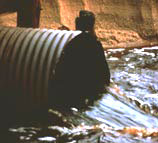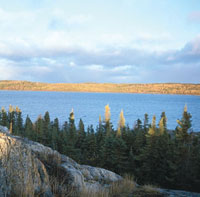
News |
- Canada Violating UN Kyoto Pacts
- Lakes Dumping Grounds for Toxic Waste
- California Sues Automakers Over Emissions
- Ontario Water Guardians Network Launched
- Standby Power Huge Energy Drain
- NGOs Allege Government Failing Species At Risk
- No Subsidies For Mackenzie Project
- Clean Air Act Delays Action
- National Park for Canada's North
- Manitoba Fading as Global Warming Leader
- Drinking Water Report Slams Feds
- Canada's Climate Crisis: Call for Immediate Action
| Canada Violating UN Kyoto Pacts | 02 November 06 |
 Canada's Environment Minister has been informed Canada is violating the Kyoto Protocol and the UN Framework Convention on Climate Change (UNFCCC), thus legally requiring action under the Canadian Environmental Protection Act (CEPA) to control greenhouse gas (GHG) emissions. Canada's Environment Minister has been informed Canada is violating the Kyoto Protocol and the UN Framework Convention on Climate Change (UNFCCC), thus legally requiring action under the Canadian Environmental Protection Act (CEPA) to control greenhouse gas (GHG) emissions. The warning came just one day after the release of a groundbreaking UK report by Sir Nicholas Stern on the global economics of climate change. The report shows that governments can afford to act - and must do so urgently - to avoid disastrous economic costs. According to the September 2006 report by the Canadian Commissioner of the Environment and Sustainable Development, the gap between Canada's GHG emissions and its Kyoto commitments is growing: Canada's GHG emissions in 2004 were 26.6% above 1990 levels, resulting in a gap of 34.6% from Canada's Kyoto target of a 6% reduction by 2008-2012. The legal opinion by international climate change lawyer Dr. Roda Verheyen, submitted to the Kyoto Compliance Committee and the Canadian Environment Minister by Friends of the Earth Canada and Friends of the Earth International, details the violations. Visit the Friends of the Earth Canada website for more information Visit the Climate Justice Programme website for more information Sources: Friends of the Earth Canda/International, Climate Justice Programme |
|
| Lakes Dumping Grounds for Toxic Waste | 31 October 06 |
 In a precedent-setting move, Environment Canada has amended the Metal Mining Effluent Regulations (MMER), under the Fisheries Act, to allow lakes to be re-defined as tailings impoundment areas. They are no longer considered to be lakes and are no longer protected under the Fisheries Act. In a precedent-setting move, Environment Canada has amended the Metal Mining Effluent Regulations (MMER), under the Fisheries Act, to allow lakes to be re-defined as tailings impoundment areas. They are no longer considered to be lakes and are no longer protected under the Fisheries Act.On October 18th, 2006 Aur Resources received permission to dump toxic waste from its copper-zinc-gold mine into two lakes in Newfoundland's largest watershed. These lakes are habitat to trout, Atlantic salmon, otter, and other species. The legalized destruction of fish-bearing lakes opens the door to destruction of other fish-bearing water bodies. Environment Canada confirmed at least nine other mine projects in British Columbia, Nunavut, Saskatchewan, and the Northwest Territories will be seeking similar amendments so they can use lakes as waste dumpsites. Officials in Environment Canada and DFO defend the amendments, saying that loss of lakes can be compensated for by altering nearby areas to create new fish habitat. Independent fish and aquatic habitat experts who examined the mining company's reports used by Environment Canada and DFO to justify the amendments say they are inadequate and scientifically inferior, and that no new fish habitat will be created. View the October 24, 2006 MiningWatch Canada press release View the October 26, 2006 Georgia Straight article View more information from MiningWatch Canada on the MMER View information from the Canadian Environmental Network on the MMER Source: MiningWatch Canada |
|
| California Sues Automakers Over Emissions | 31 October 06 |
 The State of California has sued six of the world's largest automakers over global warming, charging that greenhouse gases from their vehicles have caused billions of dollars in damages. California will seek "hundreds of millions of dollars" from the automakers in the lawsuit filed in U.S. District Court in Northern California. The State of California has sued six of the world's largest automakers over global warming, charging that greenhouse gases from their vehicles have caused billions of dollars in damages. California will seek "hundreds of millions of dollars" from the automakers in the lawsuit filed in U.S. District Court in Northern California.The lawsuit seeks monetary damages for past and ongoing contributions to global warming from emissions, and asks that the companies be held liable for future monetary damages to California. If successful, the lawsuit will be the first of its kind to hold manufacturers liable for the damages caused by their vehicles' emissions. California is spending millions to deal with reduced snow pack, beach erosion, ozone pollution and impacts on endangered animals and fish. The lawsuit also comes on the heels of California's adoption of the United States' first global warming law mandating cuts in greenhouse gas emissions. View the September 20, 2006 Reuters article View the September 20, 2006 press release from California's Attorney General Source: Reuters |
|
| Ontario Water Guardians Network Launched | 27 October 06 |
 In the wake of Ontario's Clean Water Act passing third reading on October 18th, environmental groups across the province have launched the new "Water Guardians Network" to work towards the implementation of source water protection under the Act. In the wake of Ontario's Clean Water Act passing third reading on October 18th, environmental groups across the province have launched the new "Water Guardians Network" to work towards the implementation of source water protection under the Act.The Clean Water Act is premised on the idea that source water protection should be a ground-up initiative, with contributions from local governments and citizens. While the goal of drinking water source protection has received nearly universal support, the effective implementation of the Act will depend on the detailed regulations, which have yet to be publicly released. The mission of the Water Guardians Network is to work together as stewards for the long-term preservation, protection, and improvement of water sources across Ontario. Sierra Legal Defense Fund, one of the signing members of the Network, recently released a national report card on drinking water regulations in which Ontario received the top grade. Source protection was not evaluated, but will be assessed in an upcoming report. "If Ontario wants to maintain their spot at the top of the class, they will have to demonstrate effective implementation of the Clean Water Act," said Dr. Anastasia Lintner, Staff Lawyer & Economist with Sierra Legal. View the October 25, 2006 Canadian Environmental Law Association & Environmental Defense press release View the October 18, 2006 Canadian Environmental Law Association & Environmental Defense press release Visit the Waterhole website View Canadian Environmental Law Association information on water source protection View Manitoba Wildlands' October 17, 2006 news item: Drinking Water Report Slams Feds Sources: Canadian Environmental Law Association, The Waterhole |
|
| Standby Power Huge Energy Drain | 27 October 06 |
 Many devices and appliances we use in our homes and offices actually stay on after they're shut down, using something called standby power. Everything from televisions, microwave ovens, and copy machines, to video game consoles, DVD players, stereos, and computers use huge amounts of standby power when they're idle. Many devices and appliances we use in our homes and offices actually stay on after they're shut down, using something called standby power. Everything from televisions, microwave ovens, and copy machines, to video game consoles, DVD players, stereos, and computers use huge amounts of standby power when they're idle. In 2000, Dr. Alan Meier, a staff scientist at Lawrence Berkley National Laboratories specializing in energy use and efficiency, and his team published a study revealing that standby power accounted for as much as 10% of household power-consumption. Meier estimates "that standby power consumption is responsible for 1 percent of the world's CO2 emissions". Regulators around the world have started to introduce rules so manufacturers make their products less power-hungry. Consumers can help by unplugging infrequently used devices or switching them off at the mains; by looking for energy-efficiency logos and modern, efficient power supplies when buying new equipment; and by unplugging chargers and power supplies when they are not in use. View the October 26, 2006 ABC News article View the October 9, 2006 Forbes.com article View the March 9, 2006 Economist article View US Department of Energy recommendations on standby power efficiencies Sources: ABC News, the Economist |
|
| NGOs Allege Government Failing Species At Risk | 24 October 06 |
 The Sierra Legal Defence Fund (SLDF) is appealing to the Commission for Environmental Cooperation under NAFTA in an effort to compel the Government of Canada to enforce federal species at risk legislation. The Sierra Legal Defence Fund (SLDF) is appealing to the Commission for Environmental Cooperation under NAFTA in an effort to compel the Government of Canada to enforce federal species at risk legislation.On behalf of thirteen Canadian and US nongovernmental organizations - Sierra Club (United States and Canada), Nature Canada, David Suzuki Foundation, Conservation Northwest, Environmental Defence, ForestEthics, Ontario Nature, Western Canada Wilderness Committee, BC Nature, Federation of Alberta Naturalists, the Natural History Society of Newfoundland and Labrador, Nature Nova Scotia and Nature Quebec - the SLDF filed a citizen submission asserting that Canada is failing to effectively enforce the federal Species at Risk Act (SARA). The submission asserts that Canada is frustrating the Act's purpose by failing to effectively enforce the SARA with respect to at least 197 of the 529 species identified as at risk in Canada. The CEC citizen submission mechanism allows citizens to play an active "whistleblower" role in matters relating to environmental law enforcement. The Secretariat of the CEC will now analyze the submission to determine whether it meets the requirements of Article 14 of the North American Agreement on Environmental Cooperation (NAAEC). View the October 11, 2006 Nature Canada press release View the October 12, 2006 Commission for Environmental Cooperation (CEC) press release View the October 10, 2006 Sierra Legal Defense Fund citizen submission to CEC (PDF) View information on Sierra Legal Defense Fund citizen submission to CEC View the North American Agreement on Environmental Cooperation Between the Governments of; Canada, the United Mexican States, and the USA Source: CEC, SLDF |
|
| No Subsidies For Mackenzie Project | 24 October 06 |
 A new financial analysis of the Mackenzie Gas Project (MGP) shows the proposed project is profitable without public subsidies, and that governments are failing to capture billions of dollars in potential royalties. The report was filed recently with the environmental Joint Review Panel reviewing the MGP and was commissioned by Alternatives North to look at overall economics of the project. A new financial analysis of the Mackenzie Gas Project (MGP) shows the proposed project is profitable without public subsidies, and that governments are failing to capture billions of dollars in potential royalties. The report was filed recently with the environmental Joint Review Panel reviewing the MGP and was commissioned by Alternatives North to look at overall economics of the project."The project proponents have stated repeatedly the economics of the project are 'marginal'. This work shows the exact opposite is true." said Alternatives North spokesperson, Kevin O'Reilly. Report author Jim Johnson asserts, "The Mackenzie Gas Project is a highly profitable development. My analysis shows there is no need for public subsidy to make this project viable. Using currently available cost figures, the rate of return to the proponent companies... averages 21.5% per year for the full-blown development scenario." The Canadian Government has confirmed the proponents' request for $1.2 billion in subsidies to make the project 'economically' viable. The federal government has indicated it does not support any further public subsidies for the MGP. Further negotiations on public subsidies are expected fall 2006 after Imperial Oil releases revised cost estimates for the MGP. View the October 18, 2006 Alternatives North news release and backgrounder (PDF) View the Financial and economic assessment prepared for Alternatives North (PDF) View the November 16, 2005 Deputy Prime Minister's letter to MGP proponents confirming request for $1.2 billion in subsidies to make the project economically viable View previous Manitoba Wildlands news items regarding the Mackenzie Gas Project: December 1, 2005 - Gas Pipeline Subsidies Raise Questions January 18, 2005 - Mackenzie Valley Developers "Disdain" Environmental Review October 26, 2004 - Deh Cho Seeks Pipeline Injunction Source: Alternatives North |
|
| Clean Air Act Delays Action | 19 October 06 |
 The new Canadian government released the centrepiece of its "made-in-Canada" environment agenda October 19, 2006. The Clean Air Act lacks short-term targets for cutting greenhouse emissions and smog-causing pollution. Large polluters will not be regulated under the new Act at all until at least 2010. The new Canadian government released the centrepiece of its "made-in-Canada" environment agenda October 19, 2006. The Clean Air Act lacks short-term targets for cutting greenhouse emissions and smog-causing pollution. Large polluters will not be regulated under the new Act at all until at least 2010.Matthew Bramley of the Pembina Institute noted that previous government held extensive consultations on regulation of large industrial polluters. "We've just been through three solid years of consultations. There were hundreds of meetings from 2003 to 2005." Hard caps on greenhouse gas emissions would not come into effect until 2020 or 2025 but the government will seek to cut emissions by 45 to 65 per cent by 2050. Until then, the government will set "intensity-based" emissions targets. The Clean Air Act will also transfer a number of substances previously defined as toxic under the Canadian Environmental Protection Act to a new category labeled "air pollutants." Critics say this shift is almost certain to result in a constitutional challenge. The wording used in CEPA had been tested before the Supreme Court, while the new wording has not been tested. The David Suzuki Foundation expressed harsh criticism of the new Clean Air Act, saying that it will actually lead to increased pollution. The Foundation's found that the Act lacks meaningful targets, sets most timelines in the distant future, and focuses on emissions intensity - all of which guarantee rising pollution levels in Canada. View the October 19, 2006 Toronto Star article View another October 19, 2006 Canadian Press article on Canada.com View the October 19, 2006 Canadian Press article in the Winnipeg Free Press View the October 19, 2006 David Suzuki Foundation press release View the October 19, 2006 CBC article View the October 19, 2006 Canadian Environmental Protection Act Notice of Intent to Develop and Implement Regulations and Other Measures to Reduce Air Emissions Sources: Canadian Press, David Suzuki Foundation, CBC |
|
| National Park for Canada's North | 19 October 06 |
 The Lutsel K'e Dene First Nation and Parks Canada signed an agreement October 13, 2006 that is a major step towards establishing a new National Park in Canada's Northwest Territories. The Lutsel K'e Dene First Nation and Parks Canada signed an agreement October 13, 2006 that is a major step towards establishing a new National Park in Canada's Northwest Territories.The agreement, signed in Lutsel K'e by federal Minister of Environment Rona Ambrose and Chief Adeline Jonasson, commits Parks Canada and the Lutsel K'e Dene First Nation to work cooperatively towards establishing Thaydene Nene as a National Park. Over the next several years, the parties will undertake a feasibility study and negotiate the model for how the Dene will fully participate in park operations and management. Much of the proposed new National Park lies in the MacKenzie watershed. It would secure protection for Thaydene Nene, approximately 33,000 km2 of natural and cultural area along the East Arm of Great Slave Lake, the tenth largest lake in the world. The area is ecologically diverse and represents a spectacular part of Canada where the change from boreal forest to tundra is more pronounced than anywhere in the country. It has been home to the Dene for at least 7000 years, and remains largely intact. Minister Ambrose's announcement also included a commitment to expand Nahanni National Park in the Northwest Territories - a World Heritage Site and global canoeing destination - by 2008, and promises to move ahead with other proposed parks in Canada, including the proposed Manitoba Lowlands National Park. View the October 13, 2006 Parks Canada press release View the October 13, 2006 Toronto Star article View the October 13, 2006 Canadian Boreal Initiative press release View the October 16, 2006 Environmental News Service article Sources: Parks Canada, Toronto Star, Canadian Boreal Initiative |
|
| Manitoba Fading as Global Warming Leader | 17 October 06 |
 Manitoba used to lead the rest of Canada in fighting global warming. That's changing and the province's efforts are getting weaker, according to a new David Suzuki Foundation study. Manitoba used to lead the rest of Canada in fighting global warming. That's changing and the province's efforts are getting weaker, according to a new David Suzuki Foundation study."Manitoba's leadership position on climate change is slipping," says report author Dale Marshall, a David Suzuki Foundation policy analyst. The report notes that Manitoba's greenhouse gases have now risen to 11% above 1990 levels. The report praised Manitoba for having the second-best plan in Canada (released in 2002), second only to Quebec, and commended Manitoba's target for large emission reductions, achieved partly by installing ground-source heat pumps. "A new [Manitoba] plan is set to come out soon, and we hope it will build on the province's strengths," Mr. Marshall says. "Manitoba should continue to lead on this issue... [it] also needs to rectify weaknesses such as rising emissions from transportation and agriculture, plus over-reliance on big, new hydro projects." The annual Suzuki Foundation's All Over the Map report assesses provincial and territorial action on climate change, compares each region's greenhouse gas emissions, analyzes government climate change plans and evaluates their records. View October 12, 2006 David Suzuki Foundation national press release View October 12, 2006 David Suzuki Foundation Manitoba press release (DOC) View report All Over the Map: 2006 Status Report of Provincial Climate Change Plans (PDF) View the October 12, 2006 CBC article View the 2005 David Suzuki Foundation on Provincial Climate Change Plans, see Manitoba Wildlands' October 25, 2005 news item Sources: David Suzuki Foundation, CBC |
|
| Drinking Water Report Slams Feds | 17 October 06 |
 The Sierra Legal Defense Fund (SLDF) released Waterproof 2: Canada's Drinking Water Report Card, its second report on the state of drinking water laws and policies in Canada. The investigative report is the highly anticipated follow-up to Sierra Legal's original Waterproof report which came out in 2001, shortly after the drinking water tragedy in Walkerton, Ontario. The Sierra Legal Defense Fund (SLDF) released Waterproof 2: Canada's Drinking Water Report Card, its second report on the state of drinking water laws and policies in Canada. The investigative report is the highly anticipated follow-up to Sierra Legal's original Waterproof report which came out in 2001, shortly after the drinking water tragedy in Walkerton, Ontario.Manitoba received a C+ from the SLDF, as compared to a C- in 2001. According to the report, Manitoba still needs to improve treatment standards, contaminant standards and testing standards. SLDF acknowledged that its report only evaluated laws and policies and did not evaluate drinking water source protection noting, "Had we considered this factor [source water protection], our findings would certainly have been more troubling." SLDF is planning to research and produce findings regarding water protection in a future report. View the October 6, 2006 Sierra Legal Defense Fund press release View the Executive Summary of the Sierra Legal Defense Fund report, Waterproof 2: Canada's Drinking Water Report Card (PDF) View the full report, Waterproof 2: Canada's Drinking Water Report Card, from the Sierra Legal Defense Fund (PDF) View the October 5, 2006 Globe and Mail article Sources: Sierra Legal Defense Fund, Globe and Mail |
|
| Canada's Climate Crisis: Call for Immediate Action | 13 October 06 |
 Prime Minister Steven Harper was sent of a strong letter urging the federal government to take immediate, clear and quantified action to address Canada's major environmental challenges, including action on the climate crisis and our rising greenhouse gas emissions. Prime Minister Steven Harper was sent of a strong letter urging the federal government to take immediate, clear and quantified action to address Canada's major environmental challenges, including action on the climate crisis and our rising greenhouse gas emissions.The letter, sent by the Climate Action Network/Réseau Action Climat (CAN-RAC) Canada, endorsed by 56 Canadian conservation organizations, welcomed the Conservative government's commitment to "take actions that make a difference" on the environment. Manitoba Wildlands is a signatory to the letter. The organizations points out that "now is the time for urgent action to protect the environment and human health" and "delay is not an option". The letter outlined key expectations and actions for inclusion in the government's expected environment plan. Environment Minister Rona Ambrose appeared before the House of Commons environment committee and refused to discuss timelines or targets regarding upcoming government actions to cut emissions that cause climate change and smog. The federal government is now saying that there will be no written environment 'plan', that instead they will make a 'series of announcements'. View the October 4, 2006 letter to Prime Minister Harper View the October 5, 2006 Canadian Press article Sources: Climate Action Network, Canadian Press |
|


 RSS Feeds:
RSS Feeds: